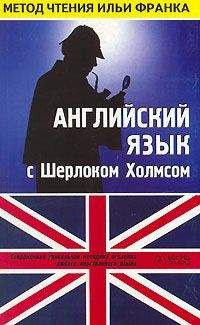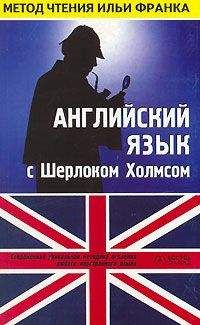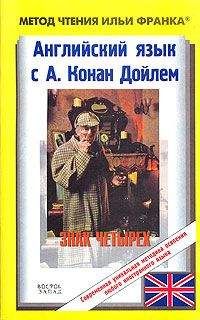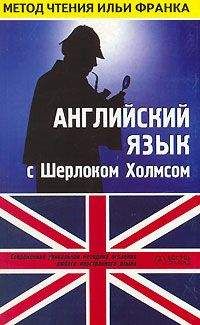Arthur Conan Doyle - Английский язык с Шерлоком Холмсом. Второй сборник рассказов (ASCII-IPA)

Помощь проекту
Английский язык с Шерлоком Холмсом. Второй сборник рассказов (ASCII-IPA) читать книгу онлайн
“I’ll be back by three (я вернусь к трем),” said he, when we had finished our meal (сказал он, когда мы закончили есть). “Both the inspector and the doctor will meet me here at that hour (инспектор и доктор встретятся здесь со мной в этот час), and I hope by that time to have cleared up any little obscurity (и я надеюсь к тому времени выяснить все мельчайшие неясные моменты; obscurity — мрак; темнота, тьма; непонятность, неясность; obscure — темный, слабо освещенный, тусклый) which the case may still present (которые все еще могут оставаться в этом деле: «которые это дело может еще представлять»; to present — представлять, являть собой; преподносить).”
Our visitors arrived at the appointed time (наши гости прибыли в назначенное время), but it was a quarter to four before my friend put in an appearance (но мой друг появился лишь без четверти четыре; to put in an appearance — появиться, показаться /особенно ненадолго/). From his expression as he entered, however (когда он вошел, по выражению его лица), I could see that all had gone well with him (я понял, что у него все прошло удачно = что его поиски увенчались успехом).
subtle [sVtl], obscurity [@b'skju:@rItI], appearance [@'pI(@)[email protected]]
We had all listened with the deepest interest to this sketch of the night’s doings, which Holmes had deduced from signs so subtle and minute that, even when he had pointed them out to us, we could scarcely follow him in his reasoning. The inspector hurried away on the instant to make inquiries about the page, while Holmes and I returned to Baker Street for breakfast.
“I’ll be back by three,” said he, when we had finished our meal. “Both the inspector and the doctor will meet me here at that hour, and I hope by that time to have cleared up any little obscurity which the case may still present.”
Our visitors arrived at the appointed time, but it was a quarter to four before my friend put in an appearance. From his expression as he entered, however, I could see that all had gone well with him.
“Any news, Inspector (есть новости, инспектор)?”
“We have got the boy, sir (мы поймали мальчишку, сэр).”
“Excellent, and I have got the men (отлично, а я поймал остальных).”
“You have got them (вы поймали их)!” we cried, all three (вскричали мы хором).
“Well, at least I have got their identity (ну, по крайней мере, установил их личности). This so-called Blessington is, as I expected (этот так называемый Блессингтон, как я и ожидал), well known at headquarters (хорошо известен в /полицейском/ управлении), and so are his assailants (как и те, кто на него напал; assailant — противник, нападающая сторона). Their names are Biddle, Hayward, and Moffat (их имена: Биддл, Хэйуорд и Моффат).”
“The Worthingdon bank gang (банда, /ограбившая/ банк в Уордингдоне),” cried the inspector (воскликнул инспектор).
“Precisely (совершенно верно),” said Holmes.
“Then Blessington must have been Sutton (значит, Блессингтон — это Саттон).”
identity [aI'dentItI], headquarters ['hed,kwO:[email protected]], assailant [@'[email protected]]
“Any news, Inspector?”
“We have got the boy, sir.”
“Excellent, and I have got the men.”
“You have got them!” we cried, all three.
“Well, at least I have got their identity. This so-called Blessington is, as I expected, well known at headquarters, and so are his assailants. Their names are Biddle, Hayward, and Moffat.”
“The Worthingdon bank gang,” cried the inspector.
“Precisely,” said Holmes.
“Then Blessington must have been Sutton.”
“Exactly (совершенно верно; exact — точный),” said Holmes.
“Why, that makes it as clear as crystal (тогда все становится абсолютно ясно; as clear as crystal — прозрачный, как кристалл; кристально чистый; четкий, ясный, понятный),” said the inspector.
But Trevelyan and I looked at each other in bewilderment (но мы с Тревельяном переглянулись: «посмотрели друг на друга» в недоумении; to bewilder — смущать, ставить в тупик; сбивать с толку, приводить в замешательство).
“You must surely remember the great Worthingdon bank business (вы, несомненно, должны помнить дело об ограблении Уортингдонского банка),” said Holmes. “Five men were in it (в нем участвовали пять человек) — these four and a fifth called Cartwright (эти четверо и пятый, по имени Картрайт). Tobin, the care-taker (Тобин, сторож), was murdered (был убит), and the thieves got away with seven thousand pounds (а воры бежали с семью тысячами фунтов). This was in 1875 (это было в 1875 году). They were all five arrested (всех пятерых арестовали), but the evidence against them was by no means conclusive (но неопровержимых доказательств /их вины/ не было; by no means — никоим образом; отнюдь не; conclusive evidence — неопровержимое доказательство). This Blessington or Sutton, who was the worst of the gang, turned informer (этот Блессингтон, или, вернее, Саттон, самый отпетый из банды, стал доносчиком). On his evidence Cartwright was hanged (благодаря его показаниям Картрайта повесили) and the other three got fifteen years apiece (а остальные трое получили по пятнадцать лет /тюрьмы/ каждый; apiece — за штуку; на каждого, каждый). When they got out the other day (когда они недавно вышли на свободу), which was some years before their full term (что было за несколько лет до их полного срока = их освободили на несколько лет досрочно), they set themselves, as you perceive (они решили, как вы понимаете; to set oneself a task — задаваться целью, ставить перед собой задачу), to hunt down the traitor (выследить предателя; to hunt — охотиться; травить, гнать; преследовать; to hunt down — выследить; поймать) and to avenge the death of their comrade upon him (и отомстить ему за смерть товарища). Twice they tried to get at him and failed (дважды они пытались подобраться к нему, но неудачно; to fail — не удаваться; потерпеть неудачу); a third time, you see, it came off (на третий раз, как видите, им это удалось; to come off — удаваться; проходить с успехом). Is there anything further which I can explain, Dr. Trevelyan (нужно ли еще что-нибудь объяснить, доктор Тревельян)?”
crystal [krIstl], perceive [[email protected]'si:v], comrade ['kOmr(e)Id]
“Exactly,” said Holmes.
“Why, that makes it as clear as crystal,” said the inspector.
But Trevelyan and I looked at each other in bewilderment.
“You must surely remember the great Worthingdon bank business,” said Holmes. “Five men were in it — these four and a fifth called Cartwright. Tobin, the care-taker, was murdered, and the thieves got away with seven thousand pounds. This was in 1875. They were all five arrested, but the evidence against them was by no means conclusive. This Blessington or Sutton, who was the worst of the gang, turned informer. On his evidence Cartwright was hanged and the other three got fifteen years apiece. When they got out the other day, which was some years before their full term, they set themselves, as you perceive, to hunt down the traitor and to avenge the death of their comrade upon him. Twice they tried to get at him and failed; a third time, you see, it came off. Is there anything further which I can explain, Dr. Trevelyan?”
“I think you have made it all remarkable clear (думаю, вы объяснили все предельно ясно),” said the doctor. “No doubt the day on which he was perturbed was the day (несомненно, в тот день, когда он разволновался, /был тем днем/) when he had seen of their release in the newspapers (когда он прочитал в газетах об их освобождении; to release — отпускать; освобождать /из заключения/; выпускать на волю).”
“Quite so (совершенно верно). His talk about a burglary was the merest blind (его разговор о краже со взломом был всего лишь для отвода глаз; blind — штора, жалюзи; предлог, отговорка; blind — слепой).”
“But why could he not tell you this (но почему он не рассказал вам об этом)?”
“Well, my dear sir, knowing the vindictive character of his old associates (видите ли, дорогой сэр, зная мстительный характер своих бывших сообщников), he was trying to hide his own identity from everybody as long as he could (он старался скрывать свою личность = имя от кого бы то ни было так долго, как только возможно). His secret was a shameful one (его тайна была постыдной), and he could not bring himself to divulge it (и он мог заставить себя раскрыть ее; to divulge — разглашать, раскрывать, обнародовать). However, wretch as he was, he was still living under the shield of British law (и все же, каким бы негодяем он ни был, он, тем не менее, находился под щитом английского закона; shield — щит; защита), and I have no doubt, Inspector, that you will see (и я не сомневаюсь, инспектор, что вы увидите) that, though that shield may fail to guard (что, хотя этот щит может и не уберечь = не уберег /гражданина/; to guard — оберегать, защищать, ограждать), the sword of justice is still there to avenge (меч правосудия покарает /преступников/; to avenge — отомстить).”
remarkable [rI'mA:[email protected](@)l], divulge [d(a)I'vVldZ], guard [gA:d], sword [sO:d]
“I think you have made it all remarkable clear,” said the doctor. “No doubt the day on which he was perturbed was the day when he had seen of their release in the newspapers.”
“Quite so. His talk about a burglary was the merest blind.”
“But why could he not tell you this?”
“Well, my dear sir, knowing the vindictive character of his old associates, he was trying to hide his own identity from everybody as long as he could. His secret was a shameful one, and he could not bring himself to divulge it. However, wretch as he was, he was still living under the shield of British law, and I have no doubt, Inspector, that you will see that, though that shield may fail to guard, the sword of justice is still there to avenge.”
Such were the singular circumstances in connection with the Resident Patient and the Brook Street Doctor (таковы были странные обстоятельства /дела/ постоянного пациента и доктора с Брук-стрит; in connection with — в связи с; касательно). From that night nothing has been seen of the three murderers by the police (с той ночи полиции /так/ ничего и не удалось узнать о трех убийцах), and it is surmised at Scotland Yard that they were among the passengers of the ill-fated steamer Norah Creina (однако в Скотланд-Ярде предполагают, что они находились среди пассажиров того злополучного парохода «Нора Крейн»), which was lost some years ago with all hands upon the Portuguese coast (который несколько лет назад затонул вместе со всей командой у португальского побережья; lost — потерянный, пропавший, погибший: lost ship — погибший корабль; hand — наемный работник; матрос), some leagues to the north of Oporto (в нескольких лигах к северу от Опорто /другое название г. Порту в Португалии/; league — лье, лига /мера длины, приблизительно равна 3 милям/). The proceedings against the page broke down for want of evidence (дело против мальчишки-слуги было закрыто за недостатком доказательств; proceedings — рассмотрение дела в суде, судебное разбирательство), and the Brook Street Mystery, as it was called (и «Загадка Брук-стрит», как ее назвали), has never until now been fully dealt with in any public print (никогда до сегодняшнего дня не освещалось полностью в открытой печати; to deal with smth. — рассматривать, заниматься /проблемой и т. д./; обсуждать что-либо; иметь дело с чем-либо).

























